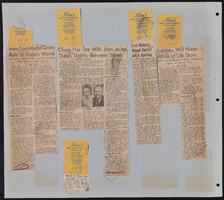Search the Special Collections and Archives Portal
Search Results

Fernando Romero oral history interview: transcript
Date
Archival Collection
Description
Oral history interview with Fernando Romero conducted by Laurents Bañuelos-Benitez on October 2, 2018 for the Latinx Voices of Southern Nevada Oral History Project. Barbara Tabach also participates in the questioning. Fernando Romero was born in El Paso, Texas in a musical home. His father and brother were avid music players, and his brother left El Paso to play in orchestra in Las Vegas. Despite not being as passionate about music as the rest of his family, music was Romero's ticket to higher education. Romero attended University of Nevada South before it was renamed University of Nevada Las Vegas. Romero has gone on to be deeply involved in the Las Vegas community. He is the current president of Hispanics in Politics. Subjects discussed in this interview include: Hispanics in Politics, Nevada Association of Latin Americans, and education.
Text

Mabel Hoggard: scrapbook
Date
Archival Collection
Description
From the Mabel Hoggard Papers (MS-00565) -- Personal papers file. This scrapbook contains mainly newspaper clippings and greeting cards to Mabel Hoggard from friends and family.
Mixed Content

Transcript of interview with Joan and Leslie Dunn by Barbara Tabach, June 20, 2016 and May 30, 2017
Date
Archival Collection
Description
Among the stories of those who came to Las Vegas in the 1960s to work at the Nevada Test Site is that of Leslie Dunn and his wife Joan. Leslie had been hired by the U.S. Public Health Service to monitor radiation from the explosions. He has tales flying into craters that make you wide-eyed. This assignment would last until his “retirement” in 1983 – one can’t really describe this couple as retired. During these early years, while Les pursued his scientist career, Joan’s chief focus was on raising their three children, Bruce Dunn, Loryn Dunn Arkow, and Sharon Dunn Levin. She also completed her education in accounting at University of Nevada, Las Vegas. She was involved with Equal Right Amendment efforts and League of Women Voters. The couple were only in their forties when Les left the PHS. As he looked forward to new opportunities, he felt compelled to pursue his longtime dream to become a builder, something he had dabbled at as a youngster with his father, Jack Dunn. Together, he an
Text

Transcript of interview with Elton Garrett by Alan Gurwitz, March 1, 1981
Date
Archival Collection
Description
On March 1, 1981, Alan Gurwitz interviewed Elton Garrett (born 1902 in St. Joseph, Missouri) about his experiences in Southern Nevada and more specifically his work in Boulder City. Garrett first talks about the development of Boulder City from its inception in 1931 and how it has grown throughout nearly fifty years. He also discusses his work in journalism for the Boulder City Journal, the building of Boulder Dam, and atomic testing at the Nevada Test Site. The second part of the interview involves a discussion of the founders of Nevada Southern University, Garrett’s work on legislative committees, and his work as a schoolteacher and school principal. The interview concludes with Garrett’s thoughts on the future of Boulder City and its continued growth.
Text

Luis F. Valera interview, January 23, 2019: transcript
Date
Archival Collection
Description
Interviewed by Nathalie Martinez. Laurents Bañuelos-Benitez also participates in the questioning. Luis F. Valera serves as the Vice President of Government Affairs at UNLV. His heritage is from Venezuela and Cuba. He has served as the Chairman of the Latin Chamber of Commerce and has been an active member of the Latino community since his pursuing his undergraduate degree at UNLV in Political Science and his Juris Doctorate degree from the William S. Boyd School of Law. His various achievements in the community and nation led him to become recognized and awarded the Arturo Cambeiro Hispanic of the Year Award in 2011.
Text

Transcript of interview with Kenneth F. Johann by Gloria Banks, March 1, 1980
Date
Archival Collection
Description
On March 1, 1980, Gloria Banks interviewed her business acquaintance, Kenneth F. Johann (born 1924 in New York City) about his work life in Las Vegas, Nevada. The two discuss the origins of Johann’s business and early land prices in Southern Nevada. Johann explains the history of his investments as well as how land development progressed in Las Vegas from the 1950s and onward.
Text

Transcript of interview with Ann K. Johnson by Wanda Cortés, March 3, 1980
Date
Archival Collection
Description
On March 3, 1980, Wanda Cortés interviewed University of Nevada, Las Vegas counselor, Ann K. Johnson (born August 28th, 1954 in Garland, Arkansas) about her life in Southern Nevada. The two discuss Johnson’s educational and occupational history. The interview concludes with a discussion on the population’s rapid growth during the seventies.
Text

Transcript of interview with Frank H. Johnson by George Baker, February 21, 1980
Date
Archival Collection
Description
On February 21, 1980, George Baker interviewed Frank H. Johnson (born July 27th , 1929 in El Paso, Texas) about his occupational history in Southern Nevada. The two discuss Johnson’s career as a journalist for the Nevada State Journal and how he transitioned into his position as a government official. Johnson then recalls problems that arose while he was chairman of the Nevada Gaming Commission. The interview concludes with Johnson speculating about the impact of industrial growth on the environment.
Text

Transcript of interview with Juanita Kilburg by Vincente C. Camacho, March 7, 1981
Date
Archival Collection
Description
On March 7, 1981, Vicente C. Camacho interviewed accounting clerk, Juanita Kilburg (born September 25th, 1923 in Los Angeles, California) on the second floor of the UNLV Dickinson Library. Kilburg explains how her family first moved to Southern Nevada and her father’s ties to the railroad. She then goes on to explain the growth of the military and Nellis Air Force Base. The interview concludes with a discussion on her work with the American Legion service organization.
Text

